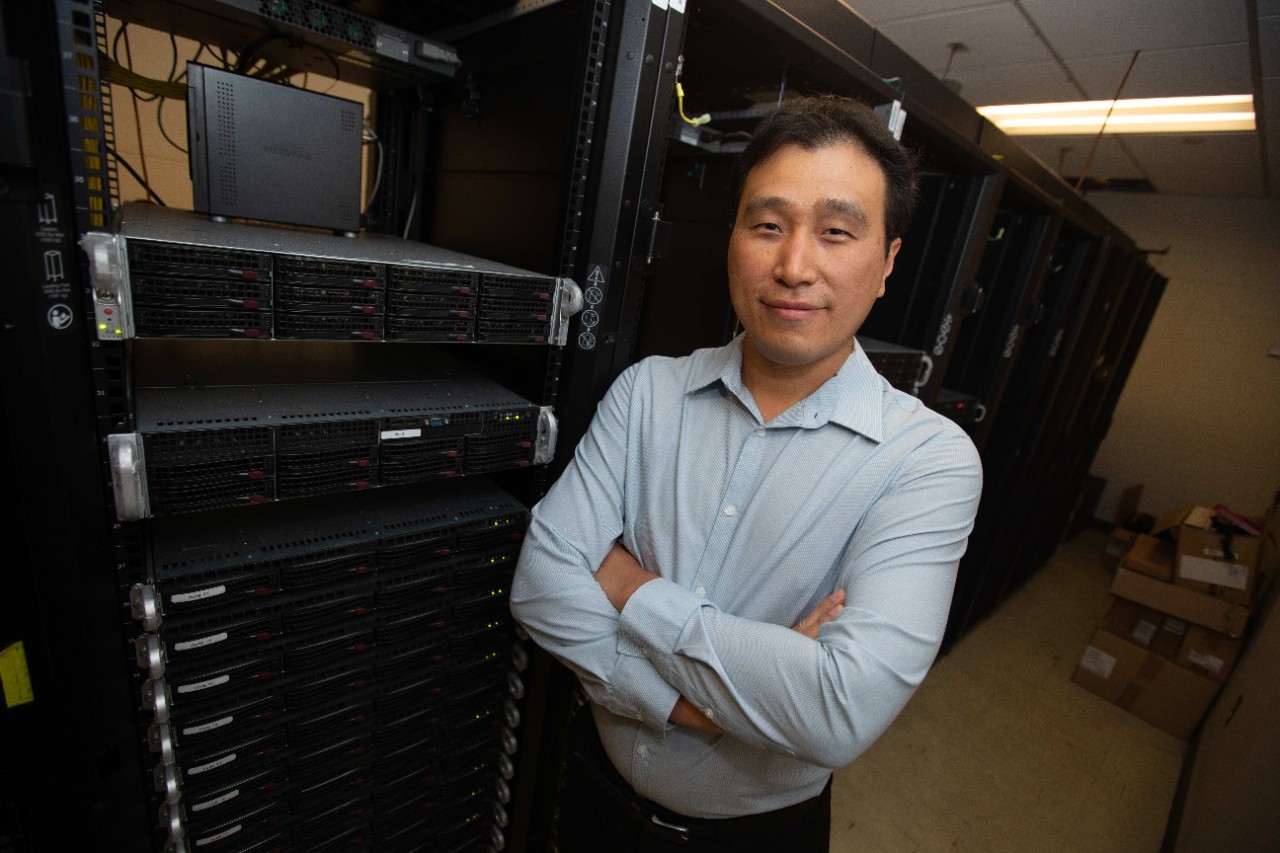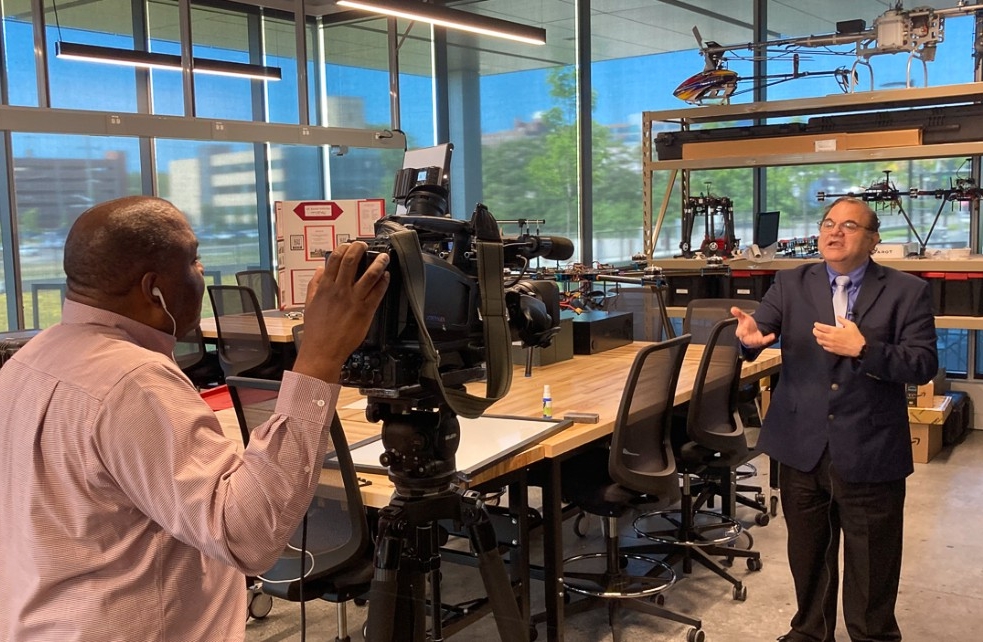
Accelerating AI, machine learning in research
UC partners on five-year, $5.1 million plan to deploy experts to Ohio higher-ed
The University of Cincinnati and two other Ohio universities will use a $5.1 million National Science Foundation grant to help the state’s researchers capitalize on artificial intelligence and machine learning.
UC, Case Western Reserve University and Ohio State University, home to the Ohio Supercomputer Center, will use the grant to hire experts who can help researchers across the state harness the power of AI.
UC’s $1.1 million portion of the grant will offer assistance across departments but particularly in the biosciences. Through professional training, the position is expected to advance Ohio’s growing high-tech industries, said Jane Combs, UC director of research technologies.
“One of our priorities is showing researchers how we can help them scale up their work,” Combs said. “That’s the fun stuff — to think big and solve bigger problems.”
Researchers at UC are developing new transparent AI systems to be more trustworthy because scientists understand how the machines make decisions.
“AI is in everyone’s living room. It’s becoming more ubiquitous across disciplines,” Combs said. “So there is a lot of discussion about the need for ethics and making sure that all the voices are represented in artificial intelligence outcomes.”
Her team works out of the Digital Futures building, UC's newest research center that opened last year, which provides for easier collaboration with its many interdisciplinary researchers.

Retired U.S. Air Force Col. Gene Lee flies against a digital foe in a simulation that uses artificial intelligence developed in part by UC aerospace engineers in this 2016 file photo. UC researchers are at the forefront of developing new applications using artificial intelligence. Photo/Lisa Ventre/UC
Aerospace Engineering Professor Kelly Cohen spoke about these pitfalls in May at an international conference on artificial intelligence that UC hosted at its Digital Futures building. UC played host to the North American Fuzzy Information Processing Society.
Cohen said there are inherent risks when the decision making behind these systems defies our understanding. That’s why he and other researchers are pursuing AI based on fuzzy logic, which relies on degrees of truth rather than a binary true-false dichotomy. This system is considered both explainable and transparent.
“Artificial intelligence has to be responsible, as in trustworthy. And trustworthy is defined as, ‘Can you explain your decisions?’ Fuzzy goes a long way toward explaining what is going on in the decision making,” Cohen said.
“Mainstream AI has fallen apart because it’s not trustworthy. It’s a black box. It’s brittle. You can’t use it to make decisions that could put people’s lives in danger,” Cohen said.
Everyone wants to use AI and machine learning right now, but not everyone is an expert or knows what it can actually do for them.
Vipin Chaudhary, Case Western Reserve University
The Ohio effort is part of a broader plan by the NSF to bring artificial intelligence and machine learning to researchers at as many academic institutions as possible nationwide.
“Everyone wants to use AI and machine learning right now, but not everyone is an expert or knows what it can actually do for them,” said project leader Vipin Chaudhary, the Kevin J. Kranzusch Professor and chair of the Department of Computer and Data Sciences at the Case School of Engineering.
“We’re going to provide the experts to help researchers from various disciplines understand and integrate the latest AI and machine learning capabilities into their work. Think of them as evangelists for using the technology and trainers for using it effectively.”

Fox19 interviews UC Professor Kelly Cohen about the future of artificial intelligence in a lab at the Digital Futures building during the North American Fuzzy Information Processing Society's annual conference at UC in May. Photo/Michael Miller
The NSF initiative and financial support illustrates the critical need for both a reliable infrastructure and an expertly trained AI and machine-learning workforce to advise and teach novice users, Chaudhary said.
The Case Western Reserve-led team will recruit and hire four AI experts—two on site at each of the other institutions—to provide tailored mentoring and training for AI users. Those users will include researchers at smaller community colleges and historically Black colleges and universities.
The new AI experts will conduct research, write technical papers, deliver tutorials at major conferences or workshops and create training materials. Initial projects will be in materials data science, agricultural data science and biomedical engineering.
“There is a growing demand for researchers to use AI and machine learning tools in a variety of disciplines—from computational chemistry to the fine arts,” said Karen Tomko, director of research software applications at OSC.
“This new project will allow the partner institutions to add experts in these burgeoning fields to their teams to help our broader research communities effectively utilize the technologies in their work.”
Featured image at top: UC computational chemist Yu Shi poses in a server room in the Chemistry Department. Shi used UC’s Advanced Research Computing Center to run simulations for his research into molten salts. Photo/Andrew Higley/UC Marketing + Brand
Next Lives Here
The University of Cincinnati is leading public urban universities into a new era of innovation and impact. Our faculty, staff and students are saving lives, changing outcomes and bending the future in our city's direction. Next Lives Here.
Related Stories
Accelerating AI, machine learning in research
July 24, 2023
The University of Cincinnati, Case Western Reserve University and Ohio State University, home to the Ohio Supercomputer Center, will use a National Science Foundation grant to hire experts who can help researchers across the state harness the power of AI.
UC hosts aerospace conference on AI
May 31, 2023
Aerospace experts from across North America are coming to the University of Cincinnati this week for a conference on artificial intelligence.
DTS hosts successful conference on AI and emerging tech
February 24, 2025
Hundreds of UC students, faculty, and staff members turned out for the Digital Technology Solutions (DTS) AI & Emerging Technology Symposium on Thursday, Feb. 20, 2025.
